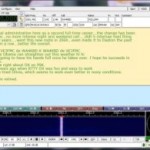Announcements:
- Happy New Year!
- The Mid-America GNU/Linux Networkers Conference (MAGNetcon) will be May 6-7, 2011 at the St. Louis Union Station Marriott. If you know anyone that might be a sponsor, exhibitor, or speaker, please let us know. Application forms are available on the web site.
- Donations are now being accepted to send LHS to the Dayton Hamvention 2011, May 20-22. Please click on the Donate button on the website.
- Donation received from Charles (no call sign given). Thank you, Charles!
- The podcast RSS feed lost it's title after a podPress upgrade. This has been fixed.
- We've been informed of a RSS feed problem for some podcatchers that use the XML tag. Joe, K1RBY, emailed us about this problem when using gPodder, but a solution has yet to be found. Anyone else see this problem? Let us know! (Ed. Note: The problem has been fixed and will be detailed in episode 54.)
- Look for new episodes of Resonant Frequency in 2011!
Topic:
- An interview with David Freese, W1HKJ, the primary author of fldigi.
- Dave, now 72 years old, has been licensed continuously since 1957 and is retired from the U.S. Coast Guard. He had been maintaining gMFSK, a Gnome multimode HF terminal program, and decided to create fldigi to prove he could still write code. He started with UNIX, then MINIX, and has been with Linux since the beginning. He's been writing ham radio programs since the 1970's. His software will run under Linux, Windows, FreeBSD, OSX, and Puppy.
- flpuppy, aka digipup, is also available from Dave's site. This is a version of Puppy Linux with fldigi, a logbook, and a geodesic calculator already installed.
- Other developers are Stelios, M0GLD, Leigh, WA5ZNU, and Skip, KH6TY.
- Much of the underlying code in fldigi is from the original gMFSK program, in particular the modem code. Other modes have been added since, along with the GUI.
- Dave says there are about 2500 users of fldigi and he spends 50 hours per week on coding and support.
- Other projects Dave is involved with include:
- NBEMS (Narrow Band Emergency Messaging System), consisting of fldigi, flarq, flwrap, flmessage, and flrig, all using the Fast Light Toolkit.
- flwkey for sending Morse code via the winKeyer chip.
- A computer-aided transceiver (CAT) program that controls the Kachina 505DSP transceiver.
- Dave describes how he came to develop fldigi using C++ and FLTK.
- More features of fldigi:
- Version 3.21 of fldigi, now in alpha test, will have the capability of sending and receiving weatherfax. It will also have an embedded browser that will work with all the PSK modes and RTTY. It has a built-in log book that stores records in ADIF files.
- While not designed specifically for contesters, fldigi is adequate for casual contesters.
- Fldigi will generate Cabrillo reports for many contests.
- The online documentation is quite extensive, at about 140 web pages, with many illustrations. There are sample screenshots of the waterfall display for various modes and audio samples of them.
- Much of the modem code in DM780 is from fldigi.
- Rick Ellis wrote code that allows the N1MM logger to display the waterfall.
- Gary, WB8ROL, "Mr. Olivia", modified fldigi for his own purposes, calling it fldigirol.
- More cool features of fldigi:
- Many of the controls in fldigi have different reactions to left-, middle- and right-click. For example, rolling the mouse wheel over the macro buttons will scroll them!
- The mouse tab in the waterfall configuration allows you to customize how the waterfall reacts to mouse wheel movement. You can also change the rig frequency by dragging in the waterfall.
- Dave recommends turning on the control hints feature (tooltips). Click Configure, User Interface, General tab, check "Show tooltips".
- Dave describes the "QSY" and "Store" buttons.
- Dave talks about how to use the Reed-Solomon Identification (RSID) features.
- The "SPOT" control allows you to search for specific strings in a PSK signal, such as "CQ CQ" or "de", allowing the program to automatically post "spots" on the PSK reporter site.
- Dave then discusses the "Map It" macro feature.
- To keep up with the alpha test group, you can subscribe to mailing lists on the Berlios alpha test web page.
- Dave offers kudos to Ed, W3NR, who answers 95% of the problem reports, and Rick in Michigan who is the principal man for audio interfacing issues.
Contact Info:
- Contact Richard at kb5jbv@gmail.com, Russ at k5tux@lhspodcast.info, or both at the same time at info@lhspodcast.info.
- Listen to the live stream every other Tuesday at 8:00pm Central time. Check the LHS web site for dates.
- Leave us a voice mail at 417-200-4811, or record an introduction to the podcast.
- Sign up for the LHS mailing list.
- Sign up for the MAGNetcon mailing list.
- LHS merchandise is available at the SHOP! link on Web site. Check out the Badgerwear or buy one of the other LHS-branded items at PrintFection.com/lhs or Cafe Press. Thanks!
- Thanks to Dave from Gamma Leonis for the theme music.
Music:
- "Which Road Takes Me Home" by Fatblueman from the album "Back to Winnipeg," courtesy of Jamendo.

